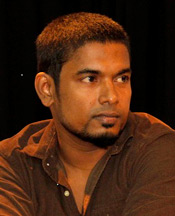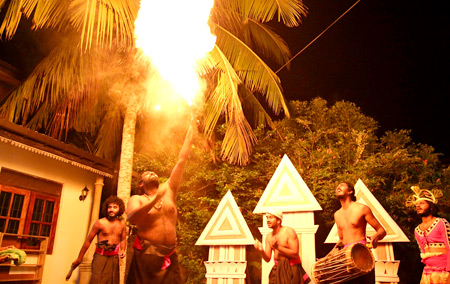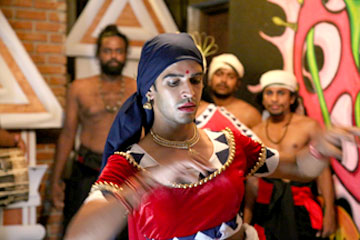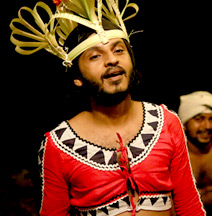DRAMA
Gotaimbara Kolama:
An ode to ritualistic narrative
by Dilshan Boange
 |
|
Dennis Perera |
At a time when the country is at a crossroads both politically and
with regard to economic strategising, a young innovative artiste
together with a troupe of performers will put on a show that seeks to
revive the mettle of ritualistic drama that seeks to appease the gods to
bring prosperity to our country.
Is this for real? Well, given the predominantly prevailing beliefs of
the times this sort of proposition will seem at best entertaining, and
have no credence beyond that. But that is due to the perceptions we
carry today.
Several centuries ago the traditional Sinhala ways and beliefs would
certainly have seen the 'sense' in an endeavour as the 'Gotaimbara
Kolama' which young filmmaker Dennis Perera director of 'The Three Wheel
Diaries', is planning to bring to life on August 15, 2015 at 7.00 p.m.
at the Sri Lanka Foundation Institute (SLFI).
"The tagline-slogan I came up for this work of performance art calls
it a Theatrical 'Yagaya' performed to evoke blessings for the country's
prosperity," explains Dennis, during a script reading and rehearsal last
week. As he elaborates with much detail how his play came to be written
and designed the way it has been, it becomes evident that his objective
as a practitioner involved in stage and screen performance art has much
to do as a thinker who values independent critical thought.
 What is at the root of the 'Gotaimbara Kolama' is a rediscovery of
the elements of narrative in ritualistic performance in traditional folk
arts and a discerning of what it can present to the logic and
sensibilities of contemporary Sri Lanka. What is at the root of the 'Gotaimbara Kolama' is a rediscovery of
the elements of narrative in ritualistic performance in traditional folk
arts and a discerning of what it can present to the logic and
sensibilities of contemporary Sri Lanka.
"There is a psychedelic effect in the rhythms of drums and repetitive
intonation of verses," notes Dennis, theorising that what the
traditional folk 'drama' in their highly ritualistic stylistics
presents, is much more than a simple narrative of dialogue and actions.
Dennis through this creation of his is on a journey of reaffirming that
richness in our culture, relegated to a position of being 'simply
rituals' that have at best a symbolic status as old folk drama, but now
out of step with 'modernity'.
Appeasing higher powers
Writing the script took him well over a year, he says. And the
process has clearly been one of research and self study and
experimentation. This is surely the result of a passion to create
something nonconformist by today's 'trends'.
"This play's story 'premise' sets out that what has not been achieved
by politicians can hopefully be achieved by a set of 'Gurunnanses," may
sound comedic. But there is no denying that politicos fail repeatedly at
what they promise to deliver for the people. So, surely the occultists
can't fail in a worse degree than that?
And further, in the olden days such a measure to find solutions to
human problems by appeasing the higher powers through song, dance, and
storytelling performances was perfectly sensible. I can't help but
remember at this point the Indian film 'Agni Varsha', which to begin
with, deals with the matter of ending a severe drought in times of a
bygone age of the subcontinent, where 'pooja' and artistic performance
are seen as means to appease the gods and bring relief to the people.
"I don't believe in importing foreign narrative structures and styles
of drama to make this work come alive.
 'Primitivism' to folk art and our ritualistic methods of narrative
were labelled as part of the politics that has decided how we exist
today. 'Primitivism' to folk art and our ritualistic methods of narrative
were labelled as part of the politics that has decided how we exist
today.
What is 'modern' and what is 'ancient' too has been politically
branded is what I think," says Dennis, who gives some serious food for
thought about how in reality there is no topography reflective of a
symmetry of features that purportedly define the 'era' we live in.
Although it is said to be the 21st century, a paddy field being
ploughed by buffaloes can be seen just as easily as high rise buildings
with state of the art comforts and they will still belong to a common
geographic and demographic entity as a district or province. In relation
to this undeniable truth, what Dennis questions is how can 'time' be
categorised and set to linearity as a trajectory of man's
anthropological journey?
Time lines
It is actually a coexistence of different elements of different times
that we constantly see, although we think we can draw 'time lines' and
declare one feature to be of a particular 'time period' and declare
something else to be of 'another time period'.
The notion that time is labelled and categorised is part of western
'conceptualism' is what Dennis expresses, saying that giving a contrived
conceptual label to 'time' helps create 'ownership' over it for those
who seek to politically label our ways and beliefs as being either valid
or outdated.
There is much truth to what Dennis theorises. After all, popular
perceptions suggest that we do tend to conceive 'modernity' or
'progress', in today's context, exclusively with the advent of the
westerners. Although models of 'republican government' were even
conceived by far thinking statesman as Ehelepola Maha Nilame (which he
called a 'sama aanduwa') while in exile in Colombo and conveyed to his
fellow Kandyan chieftains in the hope of making them see an alternative
to monarchism by overthrowing King Sri Wickramarajasinghe, even as far
back as the early 1800s, today, the foundations of modern government in
Sri Lanka are totally attributed to the Western 'models of government'.
And 'drama' as perceived by audiences today is based on structures
and narrative modalities that were introduced through foreign art forms.
But what did in fact prevail in the olden social psyche with regard to
our rituals as 'Bali', 'Thovil', 'Yaga', 'Shanthi karma' and the like?
Was it purely religious or did they achieve a form of informative
entertainment? Was it an olden type of 'infotainment'? There is much to
explore on the subject undoubtedly.
 Dennis whose first drama was 'Thathagatha' in 2008, confesses he is
not a practitioner who has been a 'student' of drama and theatre. In
fact he said he rejects institutionalised forms of learning about drama
or theatre. Dennis whose first drama was 'Thathagatha' in 2008, confesses he is
not a practitioner who has been a 'student' of drama and theatre. In
fact he said he rejects institutionalised forms of learning about drama
or theatre.
I was curious to know how Dennis gauged the 'dramatic' or the
theatricalism of the performance in the traditional forms of ritualistic
narrative, which is what his own work of performance is based on.
The contemplative Dennis says dialogue and language as verbal output
is just one element of narrative. But this is what 'drama' today as we
perceive it, principally relies mainly on.
Holistic experience
"What I want to deliver from my creation is a holistic experience
that combines different aesthetic elements to create 'drama' unlike
'theatre' we generally see on the stage today," he says.
One of the main differentiations between how 'plot' and 'conflict'
are presented in 'theatre' as per the west, and in our traditional
ritualistic narratives is that what is meant as the climax or climaxes
may be positioned in the performance. There is no drama without conflict
it is believed by some.
And some ritualistically performed narratives as 'Kolam' apparently
place hardly any emphasis on presenting 'conflict'.
"There may be references to a conflict that needs to be resolved or a
conflict that has been resolved. But depicting the conflict itself and
making that the focus of the narrative may not happen," say Dennis who
believes the traditional ways of deciding what deserves priority in the
narrative would be very different to the 'logic' of the west. In some
ways what Dennis is hoping to explore is the 'logic' that was 'ours' in
respect of ritualistic performance narratives.
While questioning the linearity of time, Dennis also speaks of the
notion that chronology as a device that is made to be subservient to
perpetuate 'historical accuracy' and views it as political act. How
ancient or modern is a creation of man -be it artistic or industrial or
architectural, is political and shares a nexus with the act of creating
labels and ownership over time through 'time periods'. Therefore what
the 'Gotaimbara Kolama' claims to be is not necessarily an 'old folk
drama'.
"Spontaneity and improvisation of dialogue is very much a key element
of this creation and that is something of a jazz method," he remarks
when asked about the language stylistic he has used for the 'drama'.
The creation 'Gotaimbara Kolama' is no simple 'production'. The
dedicated and talented cast members include -Nilanka Dahanayaka, Nino
Araliya, Amila Sandaruwan, Dhanushka Dias, Pradeep Ramanayaka, Dilum
Buddhika and Sanka Jayalath.
Financial support is provided by The Sunera Foundation, while
lighting is to be handled by Magic Lantern, and set design by Chathura
Dassanayake and Milindu Randika. Stage management is by Thisara Bandara
and Chaminda Dissanayaka.
With drummers and pyrotechnics, intoned verses and spontaneous
dialogue, dances and comedic quips, this narrative of an age old duel
between two warriors - Gotaimbara and Jayasena - who served in the army
of King Dutugemunu, is sure to be a refreshing experience to those who
enjoy storytelling that aspires to go beyond the oral discourse and into
a mode of 'energised and diversified performance'. |

